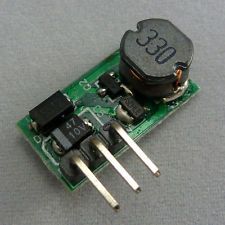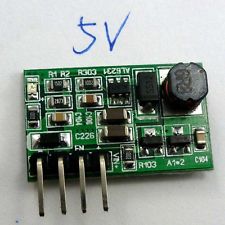EDIT: The requirements in the question below appear to be practically unsolvable, but happily after a bit of digging I actually found an alternative equivalent RS232 device which runs off a 3.7V Li-Po instead of 3.0V AAAs.
Moral of this story: hold off purchasing for as long as you can - it can prove extremely beneficial :)
I've asked a new question for my new set of requirements.
I need to connect a Wi-Fi/RS232 module to a low-powered monitoring device which needs to periodically fire up, "ping" a server, then shut down again. For maximum portability, I'd like to power the Wi-Fi module via the pair of AAA batteries built into the device itself.
This decision was considered viable based on the fact that the device in question is very low-powered and takes just over a month to drain its batteries under normal use, and the fact that the Wi-Fi module will only power on for a few moments at a time and will generally use relatively small amounts of power. I'm very confident that I'll be able to get at least a few days' worth of battery life with the Wi-Fi module attached, and it won't be a problem to put new rechargeables in the unit every so often.
Now, the Wi-Fi module I've selected draws 3.3v at a peak of 250mA, so I need a step-up converter to run it off two AAAs. However:
- The converter needs to fit inside a compartment 50x54mm in size, approximately 4-5mm thick. For what it's worth, this area is insulated, so insulation thankfully doesn't need to be taken into account.
- The unnecessity of insulation aside, the step-up converter needs to produce virtually zero EMI/RFI due to the electromagnetically sensitive medical environment the device will be used in, which won't tolerate even low levels of continuous EMI/RFI radiation particularly well (although short Wi-Fi bursts will be fine).
- I've never dealt with step-up converters before, and I'm unsure what effects the converter's electrical behavior/characteristics might have on the other electronics (a CPU, etc) in my RS232 device. What might I need to consider in this regard?
- The Wi-Fi module draws 8mA when idle, which would kill a pair of AAAs fairly quickly. I can control the serial device's DTR line like a GPIO, so it should be possible to set DTR high or low to electrically switch the step-up converter on or off. I have absolutely no idea how to go about this electronically however, although I can say that the RS232 device uses TTL signal levelling, instead of standard RS232 voltage levels.
I must admit that SMD component-based solutions wouldn't work out for me very well; I have passable non-SMD soldering skills, but I've never worked with SMD components, and if possible I would like to build this device myself, preferably successfully.
If an inexpensive premade power converter module exists that meets the above requirements, that would be a very attractive option.
Alternatively, since the adaptor/converter won't be being moved after it is fitted, directly soldering non-SMD components' legs to each other would also be an acceptable solution.


